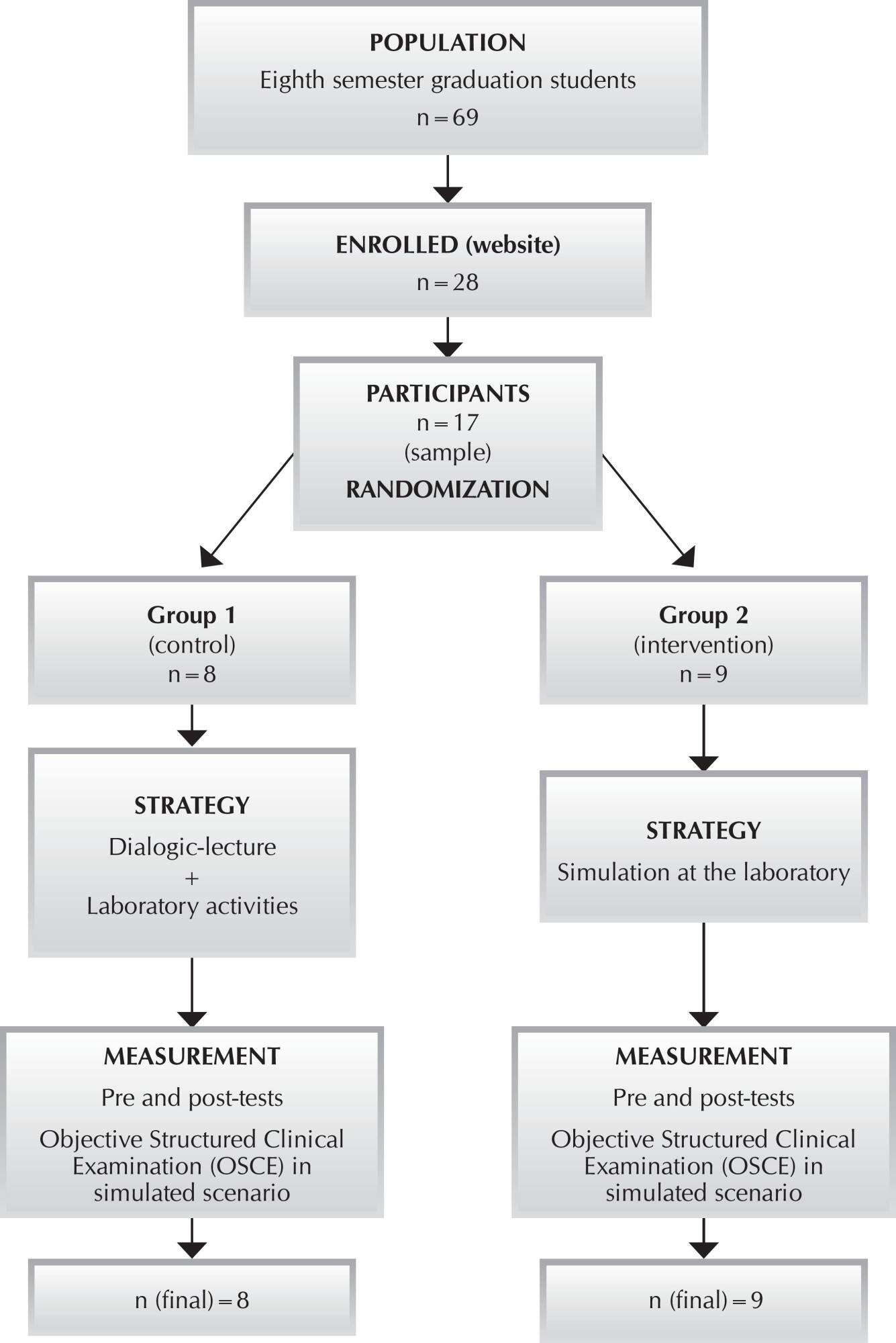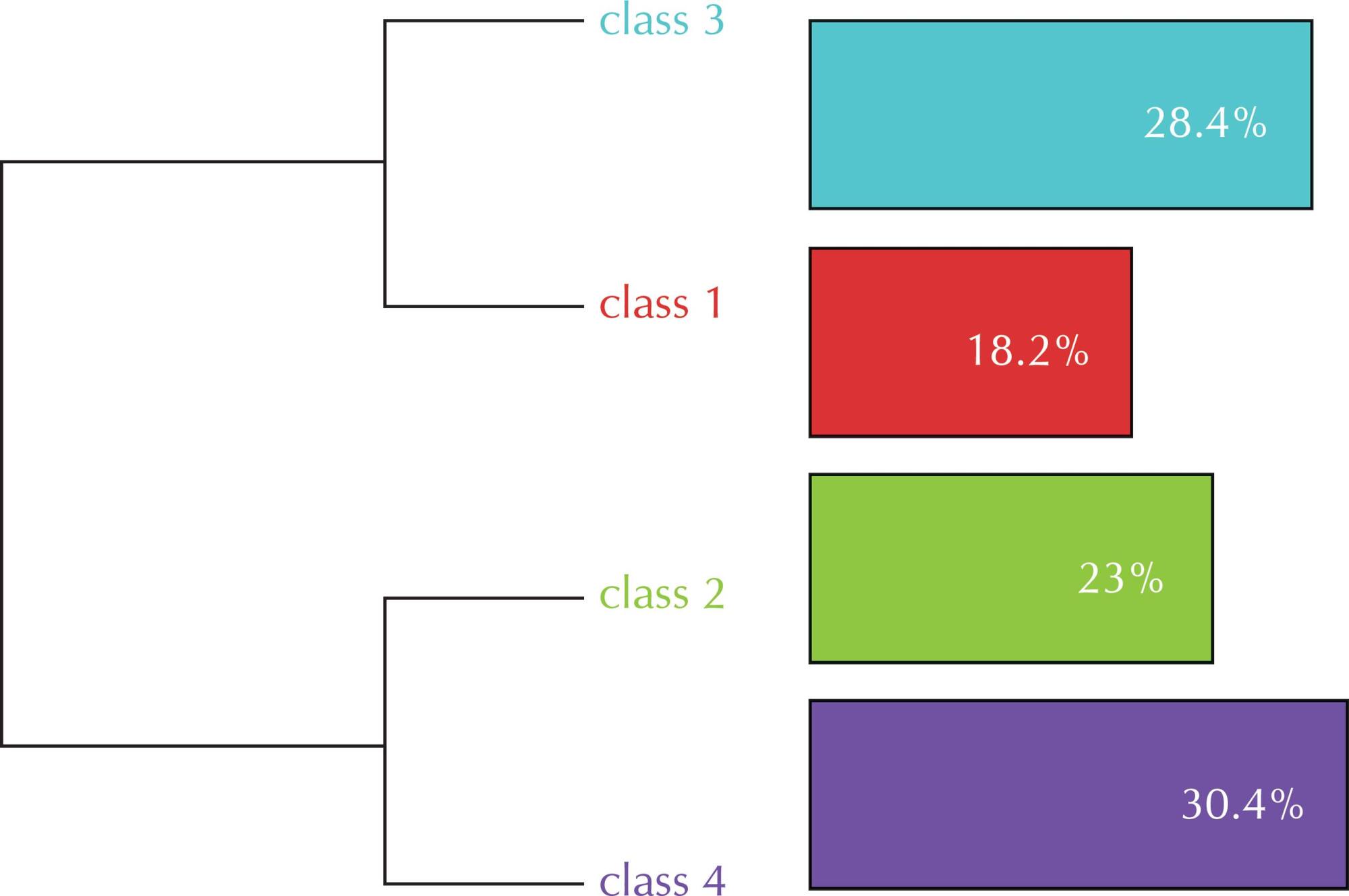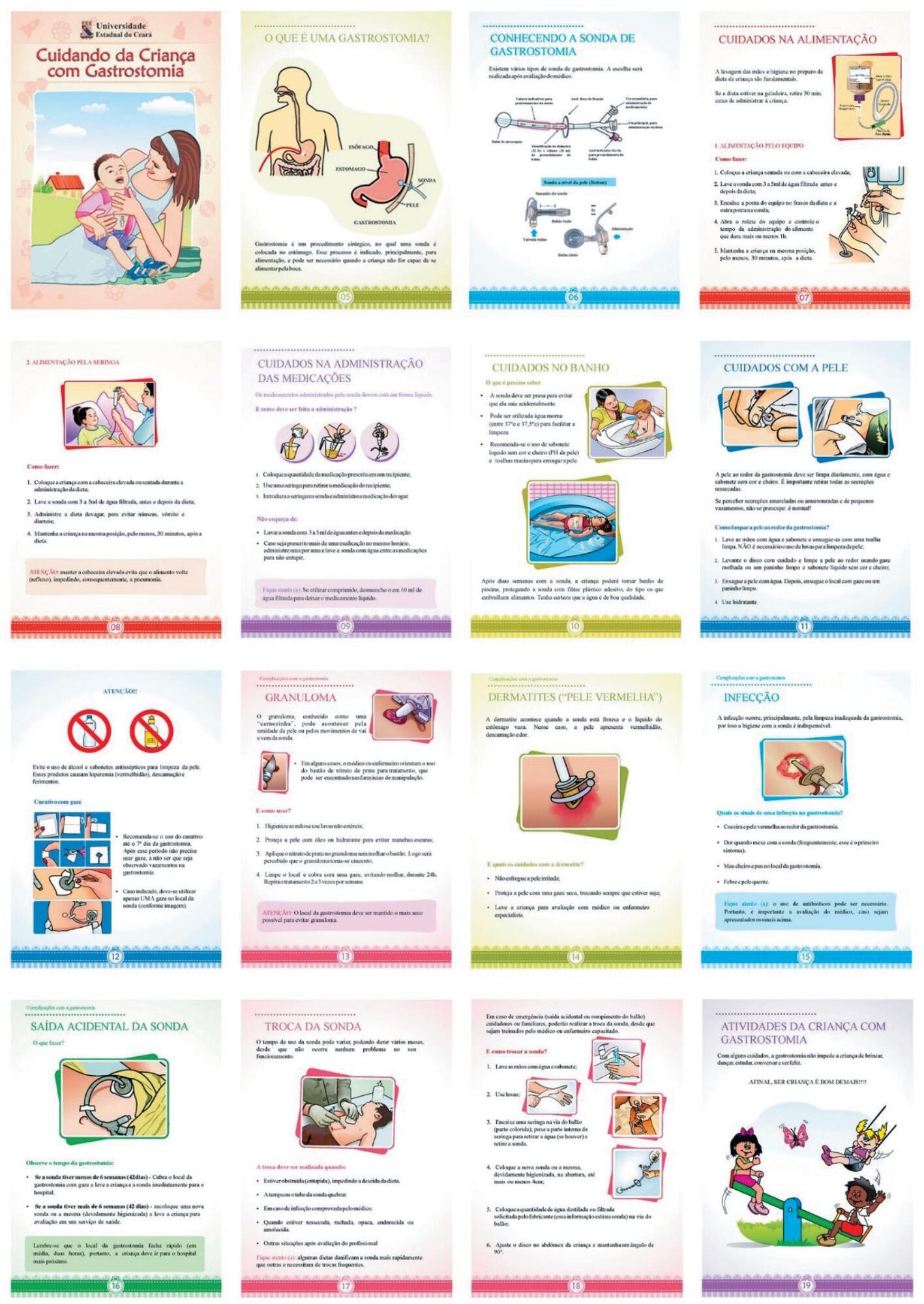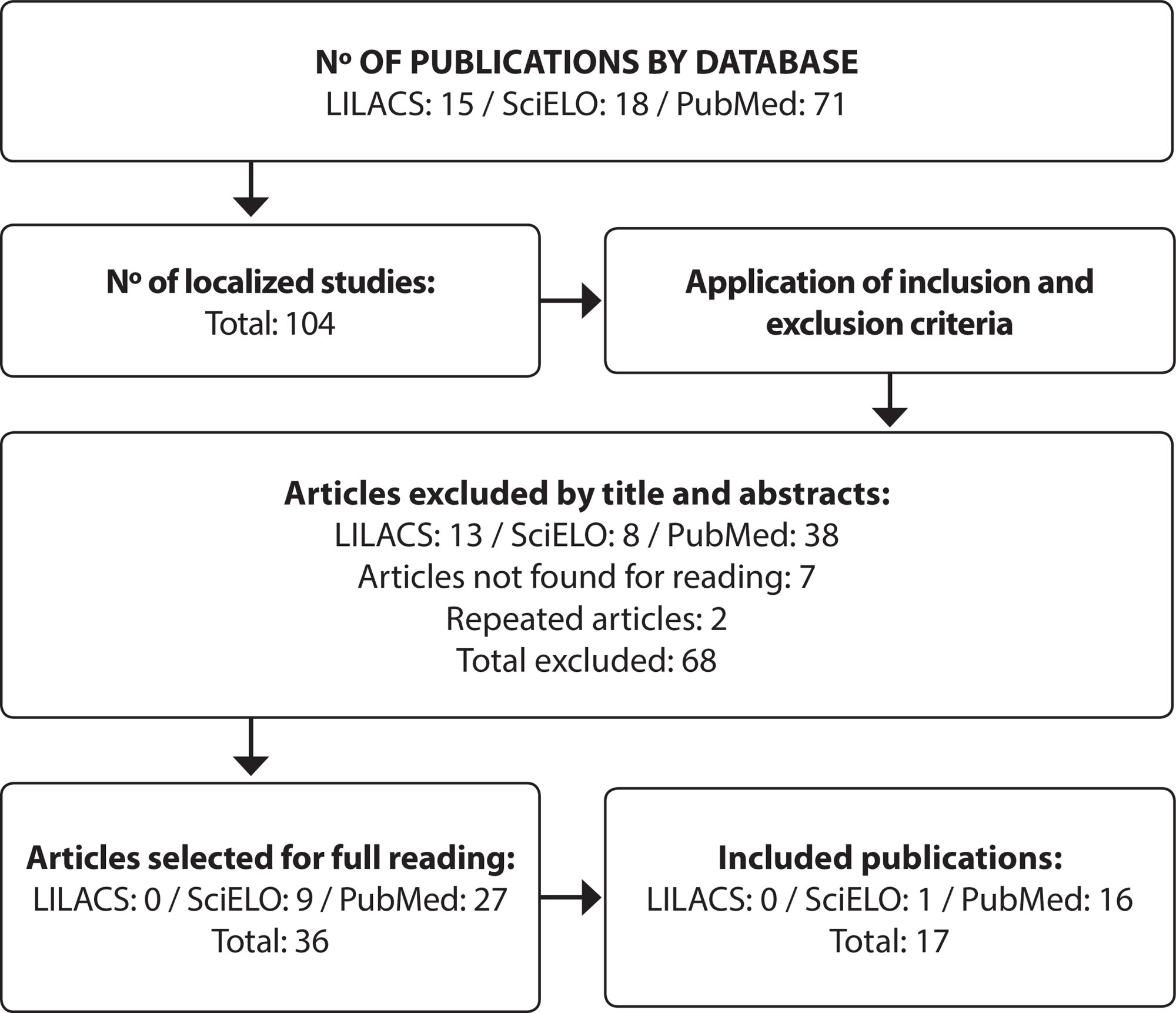-
RESEARCH
Characterization of undergraduate nursing courses according to the National Student Performance Exam
Revista Brasileira de Enfermagem. 2016;69(2):375-381
01-01-2016
Abstract
RESEARCHCharacterization of undergraduate nursing courses according to the National Student Performance Exam
Revista Brasileira de Enfermagem. 2016;69(2):375-381
01-01-2016DOI 10.1590/0034-7167.2016690222i
Views0See moreABSTRACT
Objective:
to characterize undergraduate nursing courses according to Enade (National Student Performance Exam) in 2010 and 2013.
Method:
a quantitative documental study was performed and descriptive statistics was used for data organization and analysis.
Results:
Enade report analysis enabled the identification of a reduction in the total number of institutions providing undergraduate nursing courses that passed the evaluation process. The Southeastern, Northeastern and Southern regions of Brazil included the highest numbers of courses assessed and showed the best results in the two evaluation cycles. Additionally, the courses characterized as “without a ranking” were mainly held at private institutions.
Conclusion:
the results of these evaluation cycles are important to support investigative and intervention processes about and with undergraduate nursing courses.
-
RESEARCH
Teaching airway management with laryngeal mask: randomized controlled trial
Revista Brasileira de Enfermagem. 2016;69(2):368-374
01-01-2016
Abstract
RESEARCHTeaching airway management with laryngeal mask: randomized controlled trial
Revista Brasileira de Enfermagem. 2016;69(2):368-374
01-01-2016DOI 10.1590/0034-7167.2016690221i
Views0See moreABSTRACT
Objective:
to teach airway management with laryngeal mask to nursing students through dialogic lectures along with laboratory activities or exclusively through simulation class.
Method:
randomized controlled trial. Population: eighth semester bachelor’s degree students. Sample: 17 students randomized in the intervention group (IG: simulation class) or control group (CG: dialogic lecture along with laboratory activities). Elaborated and validated instruments: written test, simulation scenario, objective structured clinical examination (checklist). Data collected from workshop. Structured clinical examination in simulation scenario filmed and evaluated by 3 experts, and written tests were applied.
Results:
24.4±4.2 years old. Right answers percentage: CG: pre-test 66±10%; post-test 84±8%. IG: pre-test 65±5%; post-test 86±11%. Scenario: CG 78±5.2%; IG 84±8.9%.
Conclusion:
strategies allowed the development of knowledge, skills and decision-making, which are essential to achieve the scenario objectives. Knowledge was incorporated in airway management with laryngeal mask, shown by the increase in the scenario and written tests scores.

-
RESEARCH
Influence of the São Paulo State innovative models on Brazil’s mental health policy
Revista Brasileira de Enfermagem. 2016;69(2):360-367
01-01-2016
Abstract
RESEARCHInfluence of the São Paulo State innovative models on Brazil’s mental health policy
Revista Brasileira de Enfermagem. 2016;69(2):360-367
01-01-2016DOI 10.1590/0034-7167.2016690220i
Views0See moreABSTRACT
Objective:
to analyze the influence of two São Paulo State experiences in the choice of psychosocial care centers as guiding service providers for the national mental health policy.
Method:
qualitative, exploratory, and descriptive study using oral history as a methodology and theoretical reference.
Results:
eight professionals involved in the deployment of the mental health policy in the cities of Santos and São Paulo between the years 1989 and 1992 were interviewed. Data were analyzed after treating the narratives and grouping the most significant content. Two central themes emerged: development of the local-regional model, and the model’s influence on the choice of the psychosocial care center.
Conclusion:
due to greater insertion of the Santos experience group in the spheres of the federal government, its influence on the choice of the substitute model was higher in ideological terms, whereas the São Paulo model had its influence restricted for political reasons.
-
RESEARCH
Stress and cardiovascular risk: multi-professional intervention in health education
Revista Brasileira de Enfermagem. 2016;69(2):351-359
01-01-2016
Abstract
RESEARCHStress and cardiovascular risk: multi-professional intervention in health education
Revista Brasileira de Enfermagem. 2016;69(2):351-359
01-01-2016DOI 10.1590/0034-7167.2016690219i
Views0See moreABSTRACT
Objective:
to identify cardiovascular risk in educators (administrators and teachers) from the South region of Brazil, evaluated before and after intervention with stress management activities and health education.
Method:
longitudinal study of the before and after type. The sample consisted of 49 participants. Variables studied were socio-demographic, morbidity antecedents and lifestyle habits. Measured risk factors for cardiovascular disease were arterial blood pressure, body mass index, ratio of waist to hip size, lipid profile and capillary blood glucose. Stress levels were evaluated using the Lipp Stress Symptoms Inventory (LSSI). The study ran for four months, with weekly meetings of a multidisciplinary team.
Results:
after intervention, the study observed a statistically significant reduction of the investigated variables, except for blood glucose levels in the administrators group.
Conclusion:
stress management activities are potential tools in the identification and control of the risk factors studied, particularly in those involving multi- and trans-disciplinary focus.
-
RESEARCH
Social representations of nursing students about hospital assistance and primary health care
Revista Brasileira de Enfermagem. 2016;69(2):343-350
01-01-2016
Abstract
RESEARCHSocial representations of nursing students about hospital assistance and primary health care
Revista Brasileira de Enfermagem. 2016;69(2):343-350
01-01-2016DOI 10.1590/0034-7167.2016690218i
Views0ABSTRACT
Objective:
To analyze how social representations of hospital and community care are structured in two groups of nursing students – 1st and 4th years.
Method:
Qualitative research oriented by the Theory of Social Representations. We used a questionnaire with Free Association of Words. Data were analyzed in the Software IRaMuTeQ 0.6 alpha 3.
Results:
We applied the method of Descending Hierarchical Classification and obtained four classes. Class 4 has the largest social representation (30.41%) within the corpus. The two organizational axes are nurse and disease/patient in the central core. On the periphery are the care and help related to the nurse and the treatment and prevention associated with the disease.
Conclusion:
Social representations focus on disease/patient and on the role of nurses in the treatment, prevention, and care. Health promotion and the social determinants of health are absent from the social representations of students.
Keywords:Hospital AssistanceNursing EducationNursing StudentsPrimary Health CareSkills-Based EducationSee more
-
RESEARCH
Prevalence of medication therapy adherence in the elderly and related factors
Revista Brasileira de Enfermagem. 2016;69(2):335-342
01-01-2016
Abstract
RESEARCHPrevalence of medication therapy adherence in the elderly and related factors
Revista Brasileira de Enfermagem. 2016;69(2):335-342
01-01-2016DOI 10.1590/0034-7167.2016690217i
Views0See moreABSTRACT
Objective:
to determine the prevalence of adherence to medication therapy in elderly outpatients; to verify whether there is an association between medication therapy adherence and demographic and socioeconomic factors, health conditions.
Method:
a quantitative, exploratory, descriptive, cross-sectional study, performed in outpatient clinics of a university hospital in Rio Grande do Sul, Brazil. Three data collection instruments were answered by a convenience sample of 107 elders. A descriptive and inferential statistical analysis was conducted.
Results:
the prevalence of adherence was 86.9%. A statistically significant association was identified between the adherence variable and receiving medical guidelines on how to take medications, and having adverse reactions. Conclusion: Nurses must know the prevalence of medication adherence and related factors in order to plan interventions that promote therapeutic success.
Conclusion:
Nurses must know the prevalence of medication adherence and related factors in order to plan interventions that promote therapeutic success.
-
RESEARCH
Family farming and human and environmental health conservation
Revista Brasileira de Enfermagem. 2016;69(2):326-334
01-01-2016
Abstract
RESEARCHFamily farming and human and environmental health conservation
Revista Brasileira de Enfermagem. 2016;69(2):326-334
01-01-2016DOI 10.1590/0034-7167.2016690216i
Views0See moreABSTRACT
Objective:
understand how farmers identify positive and negative impacts of family farming work on the environment and conserve the environmental health.
Method:
a qualitative study with 129 farmers from Ilha dos Marinheiros, Rio Grande, Brazil. Secondary data and recorded interviews were used in this study, with subsequent analysis performed by Bardin and NVivo10, both based on Enrique Leff’s cultural rationality.
Results:
the positive impacts included food production with responsibility, work appreciation, and the correct, minimum or inexistent insertion of agrochemicals. The negative aspects included excessive and incorrect use of agrochemicals and absent farming knowledge.
Conclusion:
environmental conservation consisted in reducing impacts that could have a negative effect on health, while performing work activities.
-
RESEARCH
Nursing instrument to attend mothers who recently gave birth in primary health care
Revista Brasileira de Enfermagem. 2016;69(2):316-325
01-01-2016
Abstract
RESEARCHNursing instrument to attend mothers who recently gave birth in primary health care
Revista Brasileira de Enfermagem. 2016;69(2):316-325
01-01-2016DOI 10.1590/0034-7167.2016690215I
Views0See moreABSTRACT
Objective:
To build a nursing instrument to attend mothers who have recently given birth in primary health care.
Method:
This is a methodological research developed in five stages: identification of empirical indicators associated with mothers who have recently given birth by reviewing integrative literature; evaluation of empirical indicators by focal group; instrument structuring by categorizing indicators; instrument validation using the Delphi technique; and application and development of diagnostic statements and nursing interventions.
Results:
The instrument comprises identification data on mothers who have given birth recently, on the assessment of their human needs, and on nursing Care items. In the final version, we selected 73 diagnoses and 155 nursing interventions.
Conclusion:
With the completion of this study, nurses will have an instrument for Nursing Care Systematization to attend mothers who have given birth recently in primary health care. Besides, this study will also work as a tool in research and teaching of Obstetric Nursing.
-
ORIGINAL ARTICLE
Validation of educational booklet: an educational technology in dengue prevention
Revista Brasileira de Enfermagem. 2019;72(5):1318-1325
09-16-2019
Abstract
ORIGINAL ARTICLEValidation of educational booklet: an educational technology in dengue prevention
Revista Brasileira de Enfermagem. 2019;72(5):1318-1325
09-16-2019DOI 10.1590/0034-7167-2018-0771
Views0See moreABSTRACT
Objective:
to validate a booklet on dengue prevention in order to make it an educational technology to be used with the population.
Method:
methodological study, carried out with two groups of judges specialized in health and other areas. For data analysis, the calculation of Content Validity Index was carried out.
Results:
the booklet, in general, was considered valid by the expert judges, since it obtained an overall CVI of 70%. However, it has undergone a textual and aesthetic re-elaboration. The changes were based on the substitution of expressions, phrases, information additions and language adequacy. The illustrations were redone, adding clarity, expressiveness, movement, interaction and contextualization.
Conclusion:
the booklet is valid to be used for the population, with the purpose of informing, in a playful way, the forms of prevention and combat to mosquito transmitting dengue.

-
REVIEW
Mental health of healthcare professionals in China during the new coronavirus pandemic: an integrative review
Revista Brasileira de Enfermagem. 2020;73:e20200338
09-18-2020
Abstract
REVIEWMental health of healthcare professionals in China during the new coronavirus pandemic: an integrative review
Revista Brasileira de Enfermagem. 2020;73:e20200338
09-18-2020DOI 10.1590/0034-7167-2020-0338
Views0See moreABSTRACT
Objective:
to identify publishing related to the mental health of health professionals working in the front line of the COVID-19 pandemic.
Methods:
an integrative review that included primary articles indexed in the Latin American and Caribbean Literature in Health Sciences, Medical Literature Analysis and Retrieval System Online, Cumulative Index to Nursing and Allied Health Literature, Scopus, Embase, Web of Science, Science Direct databases and US National Library of Medicine databases. The result analysis was performed descriptively, in four analytical categories.
Results:
The publishing involved aspects related to insufficient personal protective equipment, feelings of fear and stigma, the need for psychological and psychiatric support and the possibility of post-outbreak mental disorders.
Conclusion:
All mentioned aspects have a direct impact on the mental health of professionals, demanding the creation of strategies that minimize the emotional burnout of workers, considering that each country and culture reacts differently to the disease.

-
ORIGINAL ARTICLE
Religious/spiritual coping and level of hope in patients with cancer in chemotherapy
Revista Brasileira de Enfermagem. 2019;72(3):640-645
06-27-2019
Abstract
ORIGINAL ARTICLEReligious/spiritual coping and level of hope in patients with cancer in chemotherapy
Revista Brasileira de Enfermagem. 2019;72(3):640-645
06-27-2019DOI 10.1590/0034-7167-2018-0358
Views0See moreABSTRACT
Aim:
To demonstrate the relationship between religious/spiritual coping and hope in cancer patients undergoing chemotherapy.
Method:
This is a cross-sectional, descriptive study with a quantitative approach performed in a reference outpatient clinic in Caruaru, PE, between August and October 2017. A total of 82 cancer patients undergoing chemotherapy were included in the study, using the brief religious/spiritual coping scale (RCOPE-Brief) and the Herth Hope Scale (HHS).
Results:
The sample presented mean positive RCOPE scores (3.03 ± 0.41) and the level of hope was considered high (42.7 points ± 3.67). Patients who had a high RCOPE score were found to have a higher mean of Herth’s level of hope (44.12 points).
Conclusion:
This study becomes relevant to nursing professionals by encouraging care that takes into account the patient’s spiritual dimension in order to stimulate positive mechanisms of religious coping and, consequently, raise the levels of hope.
-
ORIGINAL ARTICLE
Construction and validation of an educational booklet on care for children with gastrostomy
Revista Brasileira de Enfermagem. 2020;73(3):e20190108
04-22-2020
Abstract
ORIGINAL ARTICLEConstruction and validation of an educational booklet on care for children with gastrostomy
Revista Brasileira de Enfermagem. 2020;73(3):e20190108
04-22-2020DOI 10.1590/0034-7167-2019-0108
Views0See moreABSTRACT
Objectives:
to describe the process of construction and validation of an educational booklet on care for children with gastrostomy, directed to caregivers.
Methods:
a methodological study developed in five stages: bibliographic survey; situational diagnosis; illustration, layout, design and text construction; expert validation and Flesch-Kincaid Readability calculation; validation with the target audience. Content Validity Index and Suitability Assessment of Materials were applied for expert analysis.
Results:
the Content Validity Index obtained overall score of 0.93. In the Suitability Assessment of Materials score, the booklet scored 85.2%. It presented a satisfactory readability percentage, with an overall score of 72%, and was consistent with caregivers’ assessment in the validation with the target audience, considering the explanatory technology, important and adequate.
Conclusions:
the developed educational booklet was considered valid for use by caregivers, thus contributing to the maintenance of best practices in care for children with gastrostomy.

-
REVIEW
Hospital transition care for the elderly: an integrative review
Revista Brasileira de Enfermagem. 2019;72:294-301
12-05-2019
Abstract
REVIEWHospital transition care for the elderly: an integrative review
Revista Brasileira de Enfermagem. 2019;72:294-301
12-05-2019DOI 10.1590/0034-7167-2018-0286
Views0See moreABSTRACT
Objective:
to identify evidence of scientific production on hospital transition care provided to the elderly.
Method:
an integrative review, with publications search in the MEDLINE, PubMed, LILACS, BDENF, Index Psychology and SciELO databases, with keywords and Mesh terms: elderly, hospitalization, patient discharge, health of the elderly, and transitional care, between 2013 and 2017 in English, Portuguese and Spanish. The 14 selected articles analysis was carried out through exploratory and critical reading of titles, abstracts and results of the researches.
Results:
transitional care can prevent re-hospitalizations as they enable rehabilitation, promotion and cure of illnesses in the elderly.
Final considerations:
transitional care implies the improvement of the quality of life of the elderly person, requiring skilled health professionals who involve the family through accessible communication.

-
ORIGINAL ARTICLE
Development of an appearance validity instrument for educational technology in health
Revista Brasileira de Enfermagem. 2020;73:e20190559
12-21-2020
Abstract
ORIGINAL ARTICLEDevelopment of an appearance validity instrument for educational technology in health
Revista Brasileira de Enfermagem. 2020;73:e20190559
12-21-2020DOI 10.1590/0034-7167-2019-0559
Views0ABSTRACT
Objectives:
to develop and evaluate the convergence of the instrument for the appearance validity of educational technologies in health.
Methods:
methodological study conducted in two steps. In step 1, the instrument items were developed, with subsequent content validity by nine specialists in the development of educational technologies in health. In step 2, the convergent validity between another instrument and the appearance instrument was performed. Correlation results above r> 0.3 and p <0.05 were considered as plausible convergent validity.
Results:
the ten items of the initial version of the appearance instrument were submitted to content validity that resulted in a final version with 12 items (Content Validity Index = 0.93). The correlation indexes were strong with the objective and appearance domains; moderate with motivation, organization and total; and weak with writing style.
Conclusions:
the appearance instrument demonstrated content validity and convergent validity, in addition to a strong correlation with the other instrument.
Keywords:Educational TechnologyHealth EducationMethodological Research in NursingTechnological DevelopmentValidation StudiesSee more -
ORIGINAL ARTICLE
Burnout among nursing students: predictors and association with empathy and self-efficacy
Revista Brasileira de Enfermagem. 2020;73(1):e20180280
02-10-2020
Abstract
ORIGINAL ARTICLEBurnout among nursing students: predictors and association with empathy and self-efficacy
Revista Brasileira de Enfermagem. 2020;73(1):e20180280
02-10-2020DOI 10.1590/0034-7167-2018-0280
Views0See moreABSTRACT
Objective:
to analyze burnout, its predictors and association with empathy and self-efficacy among nursing students.
Method:
cross-sectional analytical study with 284 students from five state universities in the state of Parana, Brazil. The instruments applied were: social and academic questionnaire, Maslach Burnout Inventory, Interpersonal Reactivity Index and Occupational Self-Efficacy Scale (Short Form). Spearman’s correlation and univariate and multivariate logistic analysis were used.
Results:
6.0% of the students presented high burnout, 36.3% presented high emotional exhaustion, 37.7% presented high depersonalization and 28.2% presented low personal accomplishment. The burnout predictors were: absence of physical activity; weekly workload >24 hours; low empathic concern. There were negative correlations between empathy (empathic concern and perspective taking) and depersonalization; self-efficacy and emotional exhaustion; and positive correlations between personal accomplishment and empathy and self-efficacy.
Conclusion:
Personal factors and an academic variable were burnout predictors among nursing students. The correlations suggest that self-efficacy and empathy can prevent burnout.
-
REVIEW
Positive aspects of authentic leadership in nursing work: integrative review
Revista Brasileira de Enfermagem. 2020;73(6):e20190118
08-07-2020
Abstract
REVIEWPositive aspects of authentic leadership in nursing work: integrative review
Revista Brasileira de Enfermagem. 2020;73(6):e20190118
08-07-2020DOI 10.1590/0034-7167-2019-0118
Views0See moreABSTRACT
Objective:
To identify and analyze the existing scientific production on the positive aspects of authentic leadership in the nurse’s work process.
Method:
This is an integrative literature review. The databases used were Scientific Electronic Library Online; Latin American and Caribbean Literature on Health Sciences; and National Library of Medicine – National Institutes of Health.
Results:
In this study, 17 articles were selected for analysis; 1 study (6%) was published in a national journal, and 16 (94%) were international studies. Of the 17 (100%) articles studied, 11 (65%) were developed in Canada. The hospital environment was present in the 17 (100%) articles.
Final considerations:
Authentic leadership has several positive aspects that significantly influence the nurse’s work process, such as engagement and job satisfaction, retention of new nurses, organizational commitment, among others.

Search
Search in:
Nuvem de Tags
Aged (144) Atenção Primária à Saúde (239) COVID-19 (104) Cuidados de Enfermagem (269) Educação em Enfermagem (151) Educação em Saúde (139) Enfermagem (930) Estudos de Validação (131) Health Education (144) Idoso (208) Mental Health (149) Nursing (987) Nursing Care (306) Patient Safety (151) Primary Health Care (284) Qualidade de Vida (104) Quality of Life (106) Saúde Mental (145) Segurança do Paciente (150) Validation Studies (108)



